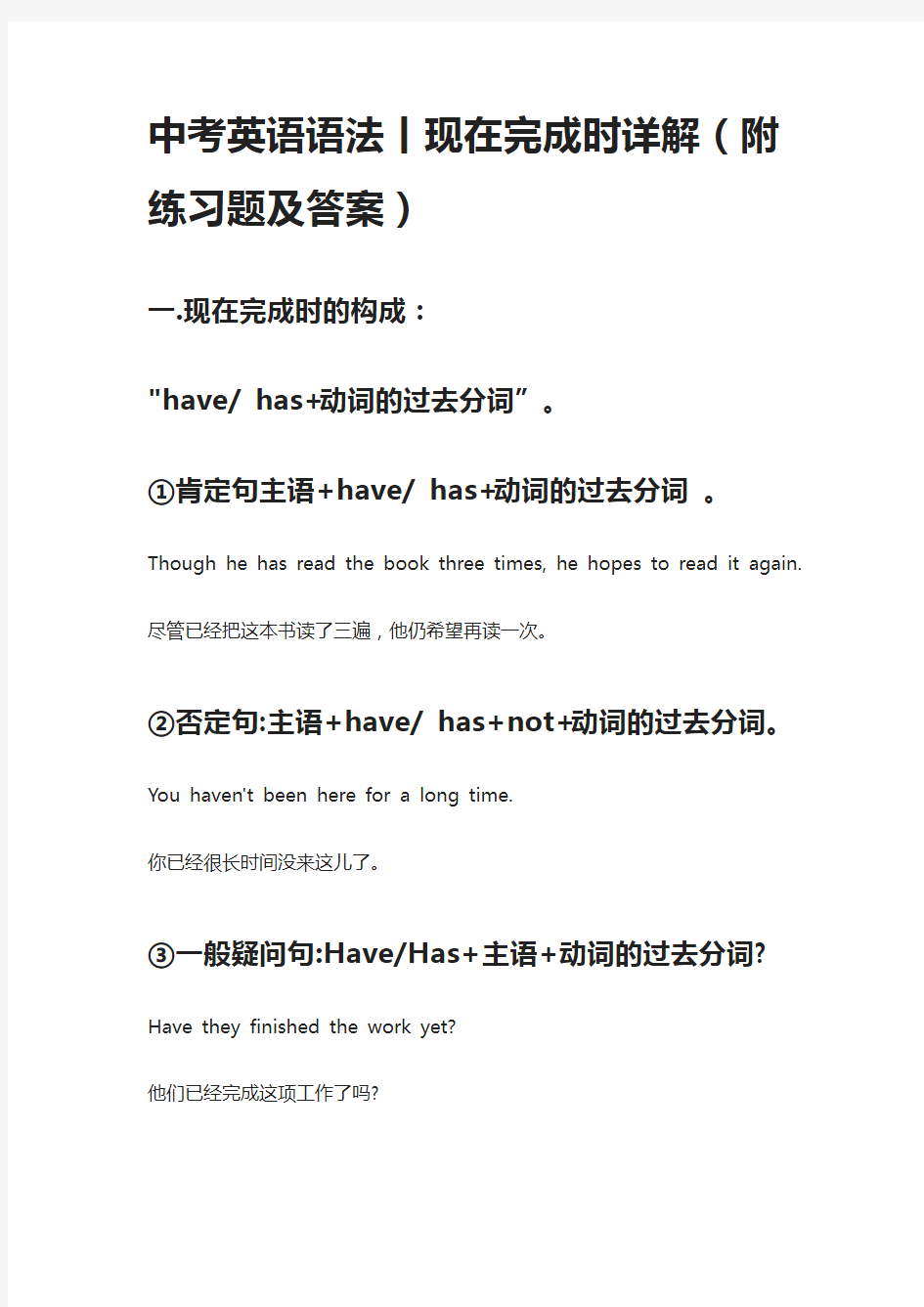
中考英语语法丨现在完成时详解(附练习题及答案)
- 格式:docx
- 大小:18.47 KB
- 文档页数:10


中考英语语法丨现在完成时详解(附练习题及答案)
一.现在完成时的构成:
"have/ has+动词的过去分词”。
①肯定句主语+have/ has+动词的过去分词。Though he has read the book three times, he hopes to read it again.
尽管已经把这本书读了三遍,他仍希望再读一次。
②否定句:主语+have/ has+not+动词的过去分词。You haven't been here for a long time.
你已经很长时间没来这儿了。
③一般疑问句:Have/Has+主语+动词的过去分词? Have they finished the work yet?
他们已经完成这项工作了吗?
二.现在完成时的用法
(1)表示发生在过去的动作对现在仍有影响
My father has gone to Shanghai. (表示人不在这里了)我爸爸去上海了。
I have already had supper. (表示现在不饿了)我已经吃过晚饭了。
(2 )表示从过去开始一直延续到现在(可能延续下去)的动作或状态
He has lived here since 1970.
他自从1970年以来一直住在这里。
My brother has been a soldier for two years.我哥哥已经参军两年了。
提示:常与现在完成时连用的时间状语有alredy(已经),yet (还),just (刚刚), never(从不),ever(曾经),before (以前), recently(近来), since then(从那时起),since(自从),so far (到目前为止),for a long time(很长一段时间), in the past/last few years (在过/最近的几年里)等。
(3 )have/has gone to和have/has been to的区别:
①have/has gone to去了某地,不能与once, twice, three times等连用
②have/has been to去过某地,可以与once, twice,three times等连用
一Hello, may I speak to Tom?
你好,我可以和汤姆通话吗?
一Oh, sorry! He has gone to London
噢,抱歉!他去伦敦了。
Helen has been to Hong Kong.
海伦去过香港(以前去过香港,已从香港回来) 。
I have been to Bijing twice. ( have been to可与次数连用)我去过北京两次。练一练:
l()scared of dogs ever since a dog hurt me when I was five years old.
A. will be
B. was
C. have been
D. would be
[解析]ever snce...意为“...以.”常用于现在完成时。现在完成时的构成为havehast动调的过去分词,故选C。
[答案]C
三. 现在完成时中短暂性动词怎样和表示一段时间的状语连用。
短暂性动词又叫终止性动词、瞬间动词或非延续性动词,只表示一时的动作,在肯定句式中不能与表示延续的时间状语连用。这类动词常用的有
go,come ,leave,find, buy, rrive,give,stop ,join, marry,die,pass away等。同学们如果对现在完成时理解不透彻,在使用时就会出现不少的错误。例如:“这本书我买了三个月了。”误译成“I have bought this book for three months.”。为了避免这类错误,我们在使用这类词时一定要学会并掌握以下“三个变化”。
1、谓语动词的变化:把短暂性动词变为延续性动词。例如:
leave →have( has) been away from
join→have( has) been( in)
buy→have( has) had
die→have( has) been dead
come( arrive)→have( has ) been here
borrow→have( has ) kept
begin to work→have(has) worked( studied)
open→have( has ) been open
get up→have( has )been up
put on→have( has )on
come back→have( has ) been back
marry →have( has) been married等。
例如:
①他来这里半小时了。
[误] He has come here for half an hour.
[正] He has been here for half an hour.
②他犹豫不决、沉默了一会儿。
[误] He hesitated and gave no reply for a while.
[正] He heitated and remained silent for a while.
2、时间状语的变化把表时间的状语“for...”变为“数词+时间名词ago"的短语形式。如: